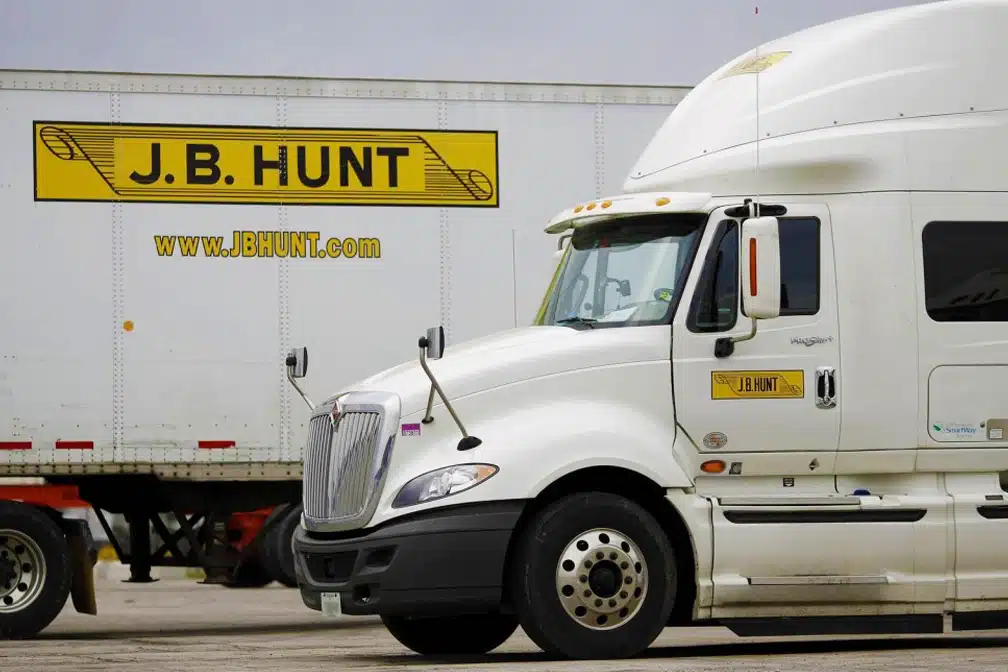July 27, 2024 12:11 am
BRINGING THE AMERICAN TRUCK DRIVER THE LATEST TRUCK DRIVER NEWS

Overview of J.B. Hunt’s Sustainability Strategy
At the recent Advanced Clean Transportation (ACT) Expo in Las Vegas, Shelley Simpson, President of J.B. Hunt Transport Services, provided insights into the company’s approach to reducing carbon emissions. Simpson’s presentation emphasized that while electrification has its place, it is not currently the most viable solution for the trucking industry. Instead, J.B. Hunt focuses on a mix of different fuels, operational efficiencies, and collaborative efforts with customers as alternatives to electrification.
EV Challenges and Alternatives to Electrification
Simpson highlighted the significant hurdles associated with fully electrifying J.B. Hunt’s fleet. She pointed out that electrifying their entire fleet would require the equivalent electricity consumption of 1.4 million households, or 1% of the entire U.S. electricity supply. Additionally, the U.S. would need to increase its electricity production by 40% to charge all registered vehicles in the country.
“Who’s willing to give their electricity up to power their home, for us to charge our entire fleet?” Simpson asked the audience, illustrating the enormity of the challenge. Despite the current impracticality, J.B. Hunt continues to test and pilot zero-emission vehicles to prepare for future technological advancements.
Three-Pillar Strategy for Carbon Reduction
J.B. Hunt aims to reduce its environmental impact by 32% by 2034 through a three-pillar strategy: alternative equipment, biogenic fuels, and fuel economy improvements. Simpson outlined each pillar:
-
Alternative Equipment: The adoption of alternative fueled trucks is hindered by high costs and operational inefficiencies. These vehicles can cost three times as much as diesel trucks and often require additional weight, which reduces their range and increases charging times. However, Simpson affirmed the importance of ongoing testing and pilots of these technologies.
-
Biogenic Fuels: Currently, 24% of J.B. Hunt’s fuel comes from renewable sources, helping to achieve a 16% reduction in carbon emission intensity. Simpson highlighted the role of biogenic fuels, such as biodiesel and renewable natural gas, in meeting their sustainability goals.
-
Fuel Economy Improvements: J.B. Hunt maintains a modern fleet with an average tractor age of 2.3 years, enabling the use of the latest fuel-saving technologies. The company employs aerodynamic enhancements, speed limiters, cab heaters, and automated manual transmissions to improve fuel economy.
Customer Collaboration and Innovation
Simpson stressed the importance of customer involvement in reducing transportation’s carbon footprint. J.B. Hunt has developed proprietary tools to help customers understand and mitigate their carbon emissions. However, the response to some initiatives, like purchasing carbon credits, has not been met with much enthusiasm.
“Many customers are interested in moving their freight with zero-emission vehicles but are surprised to learn the overall carbon intensity is not drastically reduced,” Simpson noted. She explained that sometimes simpler solutions, such as mode conversion and route optimization, are more effective.
Practical Solutions and Industry Challenges
Simpson illustrated how shifting freight to intermodal transportation and using biogenic fuels can significantly reduce emissions. For instance, shifting 30% of loads to intermodal can cut emissions by 20% and costs by 15%. Additionally, using renewable natural gas for 15% of freight can deliver an 8% carbon reduction.
However, implementing zero-emission vehicles on a large scale remains challenging. Moving just 10% of freight with battery-electric vehicles results in only a 3% carbon footprint reduction. Yet another reason Simpson suggests using alternatives to electrification.
Regulatory Landscape and Industry Responsibility
Simpson addressed the regulatory challenges facing the trucking industry, citing misalignment between state and federal regulations. The California Air Resources Board’s Advanced Clean Fleets rule and the Environmental Protection Agency’s Phase 3 regulations have different timelines, creating issues for interstate operations.
Despite these challenges, Simpson remains optimistic. She encouraged the industry to continue innovating and collaborating to meet regulatory requirements and improve sustainability. “The innovation required to meet these regulatory requirements is located in this room,” she said.
Looking Ahead at Alternatives to Electrification
J.B. Hunt’s approach to sustainability, as outlined by Simpson, emphasizes a balanced strategy incorporating alternatives to electrification including fuels, operational efficiencies, and collaborative efforts with customers. While electrification is not yet economically viable on a large scale, ongoing testing and pilot programs are essential for future adoption. The company’s commitment to reducing its carbon footprint by 32% by 2034 reflects its dedication to sustainable practices and innovation in the trucking industry.
Recent Posts
Copyright 2024. All Rights Reserved.
